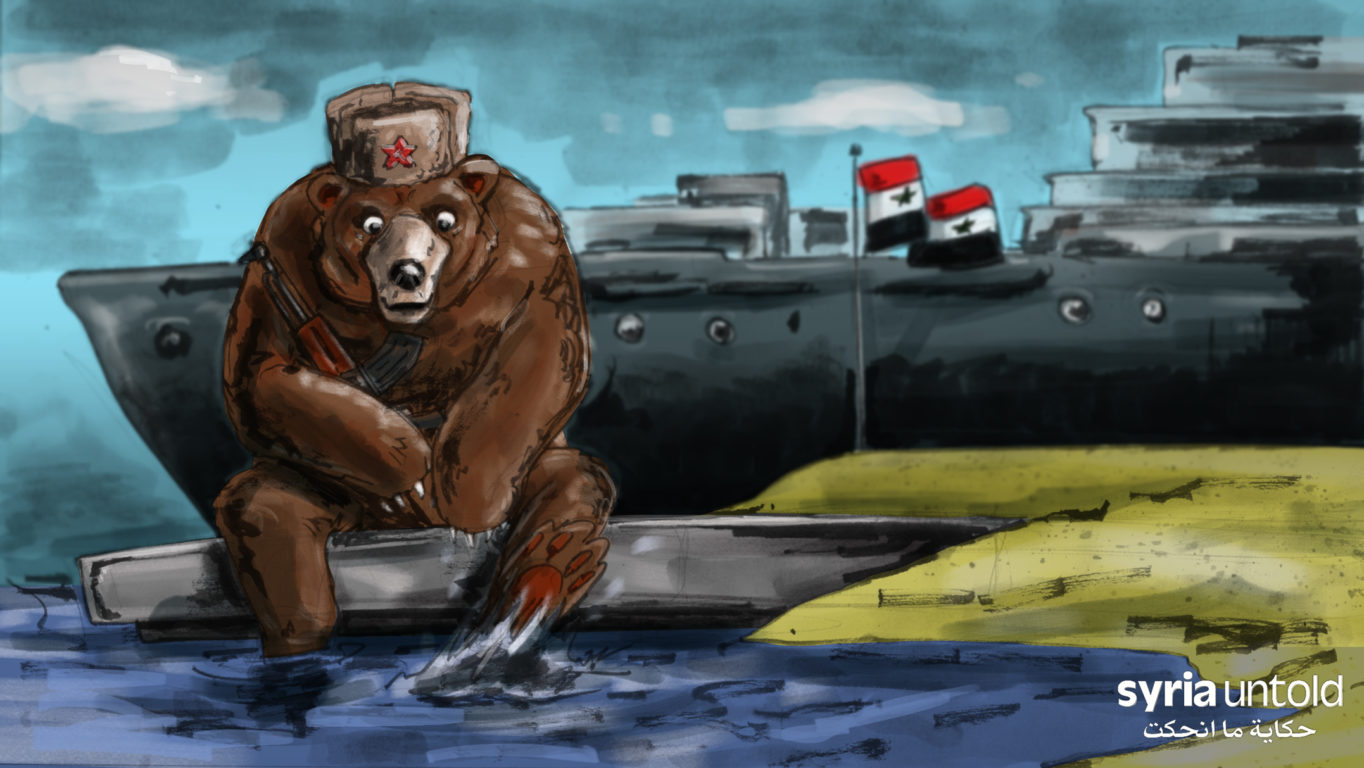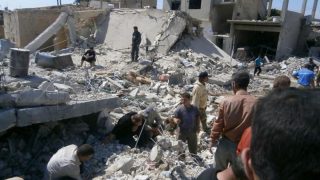(Latakia) At the ripe age of 50 Mohammed Ibrahim could find no suitable way to express his anger, except to shout at the security officer who had come to confiscate a Kalashnikov rifle and a number of grenades in his possession. He bellowed, “How will we live now? Are you gentlemen going to put food on our table? Feed our children?” He did not think they were “gentlemen”. It was merely an attempt to avoid a clash of the scale that would get him dragged to the nearest police station. Instead, he stood there choking with emotion as he watched the officers take his weapons and jump in their big Toyota trucks.
War Puts Food on Our Table
Mohammed’s story is not unique in Syria’s western coast. Since the beginning of the year, several Iran-linked militias have been disbanded in response to pressure from Russia, the US, and other international forces. Russia and Tehran have different views on managing Syria. Tehran’s management style instrumentalizes chaos and draws militias (the Basij model), while Moscow prefers imposing order and exploiting the Syrian government’s security apparatus.
Mohammed was born in one of the villages of Jableh, where the only source of income he had was an olive grove in the mountains. Living in abject poverty, he was only able to receive a very limited education. He had been a farmer all his life before joining the Desert Hawks Brigade as a volunteer two years ago. Today, he is one of the thousands of men discharged after fighting in the Iran-backed militias, which emerged in 2014, the year Hezbollah officially stepped into battle in Syria.
From the Desert Hawks to the 5th Corps...Go!
The decision to disband these militias came as no surprise to most people even though they had spent four instrumental years supporting the front ranks of the Syrian army. Orders came to disband the Desert Hawks Brigade [Liwa Suqur al-Sahar], where Mohammed Ibrahim severed, and the Sea Commandos [Mughaweer al-Bahr]. Both forces were founded by Mohamed Jaber [an officer at the presidential palace], the brother of Aymen Jaber [a leading Syrian businessman sanctioned by the West], although in practice they co-led them together.
Mohammed Ibrahim remembers how he was lured into volunteering through an intermediary office in Jableh. He recalls, “I had never thought of joining at that age. In my village, in the Jableh countryside, a big Toyota truck resembling the ones used by the Islamic State (IS) was driving around and calling those who would like to volunteer. They were offering a salary of 50,000 liras ($100) along with a monthly stipend that was almost of the same value. I could not reject the offer since I had great family responsibilities. I have three kids in college and high school. So, I joined along with other people in my village. We received training on using weapons and grenades, and on desert and mountain battles at the hand of Iranians who spoke fluent Arabic.”
In the ranks of the Desert Hawks, Mohammed Ibrahim fought many battles across Syria. He was deployed in northeast Latakia, Palmyra, south of Aleppo, and the north of Hama. The fighters were taken with the protection of petroleum fields east of the countr, including the strategic Shaer gas field. The 50-year-old man recalled, “We fought harsh battles against IS and other terrorist groups like Al-Nusra front. Many fighters died in these battles, and we spent four years moving from one place to another. Some people made a fortune from stealing people’s furniture and belongings and reselling them,” he said.
The founder and formal leader of the Desert Hawks, Mohamed Jaber, was pressured by Russia and the Assad regime to disband this force. Until Russia got involved in the Syrian crisis, Jaber had been under the wing of the Iranians. His militia largely followed Tehran’s orders. Some of his forces were even trained in Tehran. Iran-backed militias continued to operate normally after Russia enter the Syrian conflict but then Moscow hardened its stance on them and pushed for several militias to disband. Jaber did not hesitate to pivot towards Russia considering his wife was Russian..
Some members of the militia were discharged as early as 2014 while some joined official forces. Others joined the 5th Corps which was created by Russia in 2016. Later on, the Sea Commandos were also disbanded and the property of Ayman Jaber was confiscated. He owned a metal factory that manufactured explosive barrels. In fact, he was placed under house arrest.
There are many others who just like Mohammed Ibrahim were not able to join the 5th Assault Corps or other brigades of the Syrian Army because of their age and health conditions.
Ali Ibrahim (pseudonym), Mohammed’s brother, said, “We are too old to volunteer with the government or Russia. They did not acknowledge our experience (he was a soldier before 2011 and was discharged because of his age). The Iranians treated us with respect. Although they are strict with us, and we have different traditions, they respected the brave fighters. If it weren’t for the Russians, we would still be doing our work.”Ali shared his memories of the military training in Teheran that lasted three months and earned him $300. He used this money to build a room above his parents’ house back home.
Ali admitted, “Yes, it is true that when we first joined, the Iranians tried teaching us how to pray, fast, and recite the Quran. Still, only a few people actually took this up which created mutual tensions between us.”
When asked about Russian pressure to disband the militias, Ali commented, “The war is not over yet, and there are many battles coming up for government to fight in. They are going to need more soldiers to support them, so why is Russia insisting on disbanding these militias? It is clear that Russia wants to corner Syria and even clearer that it is at the request of the US and Israel. They are all friends.”
Engineer Nasser Mohamed (pseudonym, 41) joined the 5th Corps as a translator after being a general with the Desert Hawks Brigade.
“I had been in the reserve force since 2013, so I joined the Hawks given that they are based close to my house in Latakia. But, when the militia was disbanded, I had no option other than joining the 5th Corps as a Russian language translator since I graduated from a Russian university. Now, I am working with them on the battlefield of the Syrian desert," he told SyriaUntold.

According to Nasser, Russians and Iranians have pursued different approaches to the Syrian war. He clarified, “I refused joining the army because I know how that goes from bribery to corruption and even food. I was not a government employee, and this helped me join the Hawks and lead one of their troops. I stayed with the fighters in the desert around two years, and the Iranian advisors supported us. Yet, politics is what it is. We do not have the power to interfere in any international or regional decision. The Hawks were disbanded because Russia has a vision for Syria that differs from that of Tehran. It tries to support the idea of the state and its institutions rather than other entities.”
The National Defence Forces (NDF) Suffer the Greatest Loss:
The National Defence Forces (NDF) was founded by the end of 2012 as an extension of the army and comprised members who failed to join the Syrian army. It was strongly supported by Iran which trained its members, organized military and doctrinal trainings, and paid their monthly salaries. In 2017, Iran officially called for recognition of the legitimacy of the NDF.The Iranian commander of the Iranian Revolutionary Guard Corps (IRGC) Major General Mohammad Ali Jafari said in a press conference in Teheran that the Syrian government and the People’s Council have to pass a law confirming the legitimacy of the NDF. However, the militia has a bad reputation on the Syrian coast and capital because it was involved in robberies and lost battles. It has also been a real burden to Russia in its areas of influence. For these reasons, Russia has insisted on disbanding this militia due to its mistreatment of people and increased military failures.
Yasser Al Hussein, a former food vendor, served at the headquarters of the NDF at the Latakia Sports City for more than three years where he witnessed so many stories. This was the case until the decision to surrender all the NDF’s forces and resources to the army and gradually distance the NDF from the battlefields.
Today, the discussion is on disbanding the NDF after its role was dwarfed which is what happened in Al-Hamah and Qudsaya in Damascus.
The 38-year-old man now works at a real estate office and has not been listed among the reserve forces for health reasons. He said, “For many years, the NDF operated on the frontlines. Is it fair to treat it this way today? Is that our reward? Isn’t this treason?”
Yasser’s words stand in contrast to the general popular relief disbanding this militia on the coast and other places. Living in militia areas was a nightmare for coastal, city, and rural residents. It left them with memories marked by hate and resentment towards the militiamen who did not spare a home from robbery. According to the popular story, they even robbed the houses of the poor in Latakia when they were actually supposed to protect them from the attacks of Al-Nusra Front and other terrorist groups.
Abou Ahmad, Salim Nouri (pseudonym, 61) lives in Al-Mashroh Al-Asher project. He said, “My Kia car was stolen as it was parked in front of my house, and I later spotted it near an NDF checkpoint next to Sports City. When I contacted some people from the NDF, they threatened to wipe me off the face of the earth. So, I tried to report it to the police, but they did not dare report the robbery unless it was against an anonymous side. I know I’m not the only one who had their car stolen, because there is now a network of former NDF members who are armed and robbing people, cars, and shops.”
Between 2014 and 2016, this militia turned into a major force on the coast, and the other security departments did not dare stand in the way. Once they failed to defend the villages north of Latakia in the 2013 attack, people positively received the Russian decision.Even Iran no longer considers the militia as support especially with the rise of real Shiite militias like the Afghan ones (Liwa Fatemiyoun, Liwa Zainab, Badr Organization, etc.). So, Tehran suspended their pay checks for more than a year which pushed the militia followers to leave and join the official army or the 5th Corps. Some of them even stayed home. Added to that was the decision of the Syrian minister of defense who offered these fighters annual contracts if they decide to join the official army. The Syrian leadership even issued direct orders to stop issuing and accepting security clearances carried by fighters outside the official army in all Syrian provinces. The security forces also stopped assigning tasks to those fighters.
Foreign analysts have estimated the number of pro-Syrian regime militia members to be in the range of 50,000 to 80,000 men. The number of currently discharged militia members whether they joined the 5th Corps, the army, or even the Tiger Forces is unknown given the absence of official statistics. The Tiger Forces lead by Suheil al-Hassan has received the highest requests from fighters wanting to join since this organization has Russian and governmental support and offers steady paychecks and bonuses. The number of Tiger Forces was previously at least 30,000 if one is to be critical of exaggerated numbers.
Who Is Behind All the Robberies?
Not a week passes without news of car theft and shop robberies being reported across the coast. Those actions are perpetrated by armed people in military clothes. The assumption is that those people used to be in militias, especially the National “Burglary” Forces, a sarcastic name given to the NDF. There is also proof that not all weapons were retrieved from the NDF. It is true that they have been weakened, yet arresting them is complicated as some of them have strong ties with influential figures and forces.
Salim noted that the complaints against those people have been forwarded to the Russians. Some people no longer trust in the ability of security forces to bring back their belongings, and the Russians are trying to keep those connected to them happy by reporting what is happening to the security forces and asking them to interfere in solving the issue. Salim said, “The Iranians did not interfere in anything related to such groups despite being bothered by them. The Russians however are interfering through their high-ranking generals.” The Russians have given attention to these issues because they did not trust that the security forces will act against these thieves.
The Russians were able to reduce the popular tensions towards these members and create an expressed relaxed environment among many supporters. They did not regret the breaking of ties between Iran and the militias despite the great investment Iran made throughout the Syrian war. Some expect those expenses to exceed 30 billion dollars. The latest victory against Iranian presence in Latakia was the removal of the military checkpoint earlier this year (probably managed by Syrian members of Hezbollah because the mosque and the university are the most important Shiite locations on the coast) around Ar-Rasul al-Aazam mosque and university.
The activist from the opposition Jamal Zaher (pseudonym) who teaches at Tishreen University commented on the disbanding of the Iranian militia, “The way Iran managed the Syrian crisis and mobilized some of its members exploited the economic need of the inhabitants of rural areas specifically. It does not matter if that happened directly or through local partners. This probably was an expression of Iran’s age-old desire to convert residents into Shiites who would support it when the time comes. Iran’s desire to be on the Syrian coast is very strong and urgent, but Russia is fighting it under the table and in public. It refuses for the coast to be under Iranian control. Russia has refused for example Iran’s presence in areas of the Syrian coast like Wadi Qandil and Al-Bassit. Instead, it redirected Iran to other internal investments,” including investments in the phosphate fields near Palmyra and planting in Sahl al-Ghab surroundings.
Dr. Jamal added that the residents benefited the most as they got rid of the oppression imposed by such groups who exploited people, the economy, and other aspects of daily life. He continued, “These militias have previously challenged security forces in public and murdered some of them. One of the officers killed was in the traffic control department in the city. He was killed because he issued a ticket to a car belonging to the militia. The incident almost led to a real battle around Al Ziraa square a year ago. This militias seeped into people’s daily lives and did not abide by any law (from queuing in front of bakeries to distributing aid), so by disbanding it, the Russians perhaps unwillingly relieved the people and earned even greater support.”
At the local level, he said, “Disbanding the militia paved the way to a greater presence of the government’s security apparatus on the coast which suffered from their behaviour for years. The Russian relationship with the coast is also, in general, a lot better than the relationship with Iran. Russians are generally secular and not religious. Their daily rituals are not very different from those of the residents of the coast. The Iranians however were not close to the people and were not present in the streets of the city. One of the Russian soldiers even married a girl from the countryside of Tartus around half a year ago.”
It is true that there are many discharged fighters from these militias, and this has negatively impacted the economy. Yet, Russian expansion at the social level mitigated negative repercussions as expected due to the high number of fighters. The creation of the 5th Corps helped abstain some of those fighters. Moreover, the fact that Iran did not publicly oppose the disbanding, given its shaky situation on the Syrian scene, also helped contain the negative impact of this decision. However, the current results do not contract the idea that what happened was only an element of a bigger crisis that has been simply postponed rather than averted.





